SRM-AP All News
ALL News
- Ganji Harikrishna earns a dream offer of 17 LPA at Zuora July 29, 2021
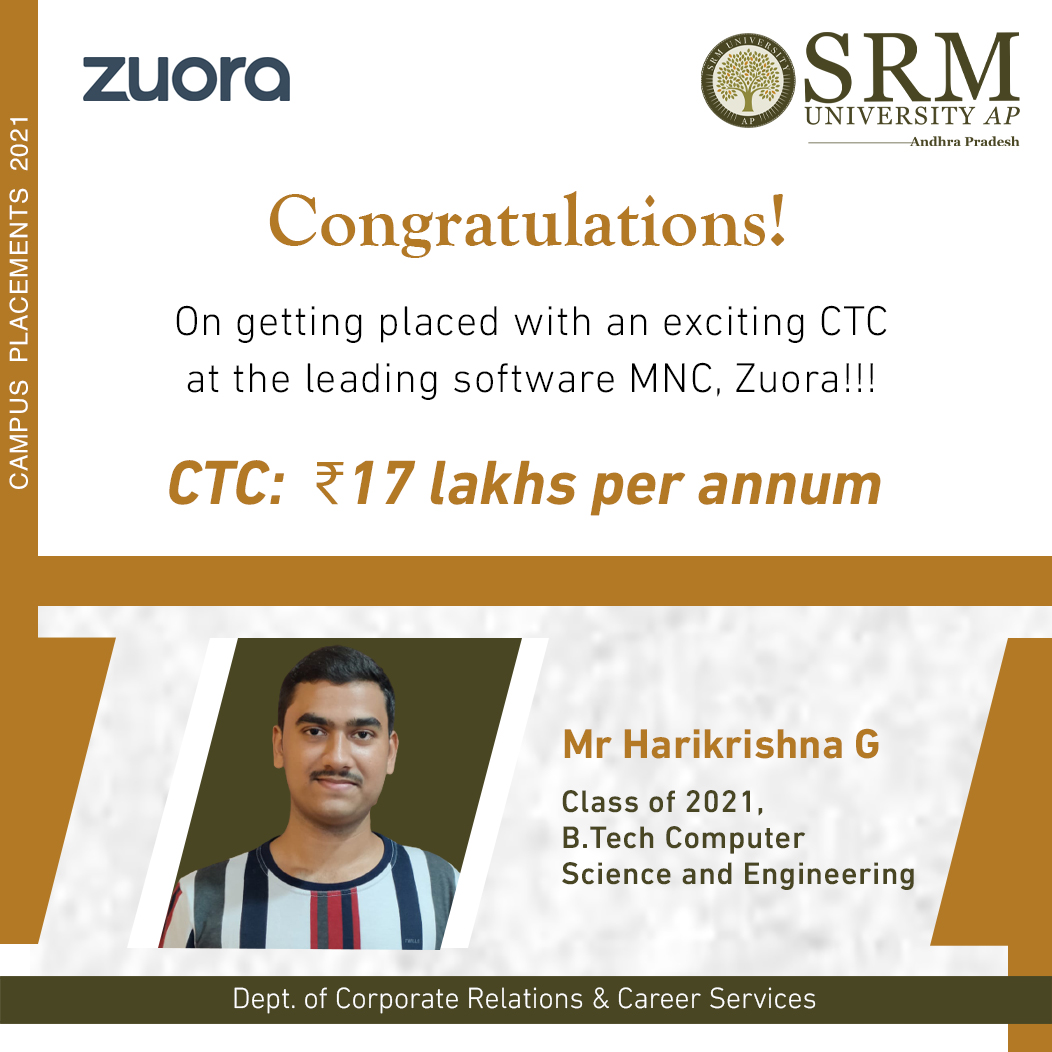 The maiden graduates of SRM University-AP have secured 100 per cent placements in the campus recruitment drive where 500+ reputed companies from India and abroad visited our university. More than 70 per cent of the students successfully bagged the dream and super dream offers. Ganji Harikrishna, a CSE graduate, received a dream offer with a salary package of 17 lakhs per annum from ZUORA, a leading software MNC. He joined as a full-time Senior Development Engineer (SDE) and would work in their Chennai office.
The maiden graduates of SRM University-AP have secured 100 per cent placements in the campus recruitment drive where 500+ reputed companies from India and abroad visited our university. More than 70 per cent of the students successfully bagged the dream and super dream offers. Ganji Harikrishna, a CSE graduate, received a dream offer with a salary package of 17 lakhs per annum from ZUORA, a leading software MNC. He joined as a full-time Senior Development Engineer (SDE) and would work in their Chennai office.Student Testimonial
SRM AP is a great place to learn new things and what makes me excited about it is the excellent group of faculty and state-of-art infrastructure. Faculty at SRMAP are from reputed academies spread in and outside the country, and they are highly interactive with students. The training and placement cell organises personality development programmes, group discussions, mock interviews with industry experts, and personality development training sessions for the candidates. The all-round development training made me confident to face the challenges associated with interviews. Besides the aptitude and soft skills training, SRM AP provides CCC training for those who are very good at Computer Science Fundamentals and Coding. The curriculum followed by CCC was great and they were interactive with the students in clarifying their doubts in coding and as well as further rounds of interviews.
There was great motivation from the Corporate Relations and Career Services Department and faculty members. They trained me with the tips to clear the interview. I appreciate the efforts made by the CRCS department in bringing such top MNC’s like AMAZON, PAYPAL, AB InBev etc. Faculty members worked very hard for the success of each student, especially our HOD, Dr Raghunathan has been of firm support to all things associated with the CSE Department.
Continue reading → - Undergraduates bring off one more patent to SRM University-AP July 27, 2021
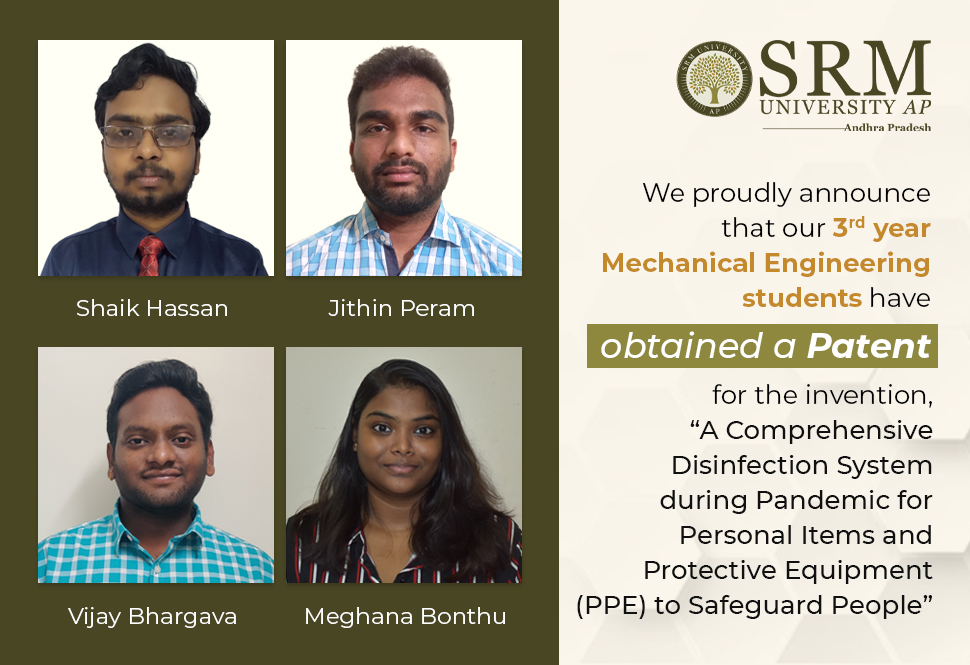 Young researchers from Mechanical Engineering- S.K Hassan, M.Vijaya Bhargava, Jithin Peram, and Meghana Bonthu- have added one more laurel to SRM University-AP by inventing something novel! Under the supervision of faculty from the Department of Mechanical Engineering, the quartet have published a patent A Comprehensive Disinfection System during Pandemic for Personal Items and Protective Equipment(PPE) to Safeguard People.
Young researchers from Mechanical Engineering- S.K Hassan, M.Vijaya Bhargava, Jithin Peram, and Meghana Bonthu- have added one more laurel to SRM University-AP by inventing something novel! Under the supervision of faculty from the Department of Mechanical Engineering, the quartet have published a patent A Comprehensive Disinfection System during Pandemic for Personal Items and Protective Equipment(PPE) to Safeguard People.The current Covid-19 pandemic has led to an enormous demand for gadgets/objects for personal protection. To prevent the spread of the virus which proliferates also through surface transmission, it is important to disinfect objects of common use. One of the ways suggested is to use a UV-C disinfecting box that is efficient and effective in deactivating the COVID-19 virus. The novelty of the product prototype is the use of a UVC transparent material (fused silica quartz glass tubes). This not only physically supports the objects to be disinfected but also improves the effectiveness of disinfection. The aluminium foil which the students have used, a UV reflecting material, was used as the inner lining of the box for effective utilization of the UVC light emitted by the UVC lamps. Care has been taken to prevent leakage of UVC radiation out of the system. COVID-19 virus can be inactivated in 5 minutes by UVC irradiation in this disinfection box.
This novel product can help in efficiently sanitizing normal household items such as mobile phones, keys, purses, grocery and also PPE kits (masks, gloves, visors etc.). This product is not only affordable but also makes disinfection faster. Moreover, the operational process is simple – open the door, place the objects, turn it on and then retrieve them sanitised within minutes.
“We are looking forward to taking up this UV Box to the next stage of implementation with a more compact and more efficient mechanism”, says the proud team behind the invention. “We are ready to undertake new projects and with the help and support from Dr Venkat Nori and other faculty members”, they added.
Link to patent document: https://ipindia.gov.in/writereaddata/Portal/IPOJournal/1_4971_1/Part-1.pdf
Continue reading → - SRM University- AP ranked as the second Top Emerging Engineering Institute July 27, 2021
SRM University-AP, Andhra Pradesh has been ranked second among Top Emerging Engineering Institute – Telangana & AP in the Times Engineering Institute Ranking Survey 2021. The research aimed to arrive at a list of top engineering colleges offering full-time courses, including four-year courses in Telangana and Andhra Pradesh.
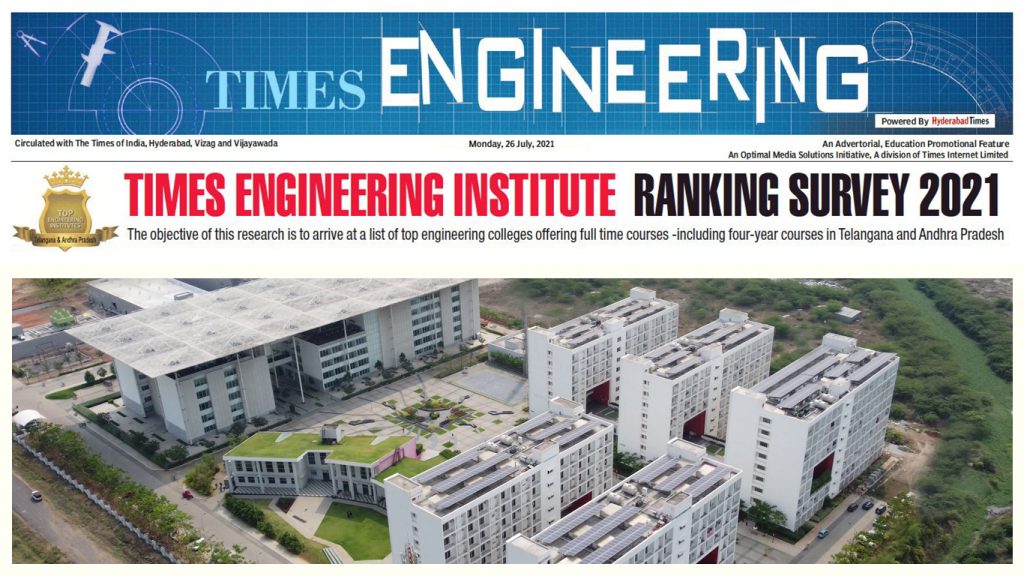 Designed by the renowned American builders Perkins + Will, SRM University-AP is a healthy, sustainable place to live, learn, work, play, and pursue research. The university offers various engineering, sciences, social sciences, entrepreneurial and management courses through its 17 departments spread across three schools. The campus is adorned with state-of-the-art labs equipped with cutting edge technology, 6 wifi enable hostels for 1500 students, a dining area with 1000 seating, an auditorium with 1000 seating capacity, a library with 100000+ books and offline/online subscriptions and many more.
Designed by the renowned American builders Perkins + Will, SRM University-AP is a healthy, sustainable place to live, learn, work, play, and pursue research. The university offers various engineering, sciences, social sciences, entrepreneurial and management courses through its 17 departments spread across three schools. The campus is adorned with state-of-the-art labs equipped with cutting edge technology, 6 wifi enable hostels for 1500 students, a dining area with 1000 seating, an auditorium with 1000 seating capacity, a library with 100000+ books and offline/online subscriptions and many more.SRM University-AP offers best in class education with the ‘Interdisciplinary Experiential Active Learning’ (IDEAL) curriculum, ‘Undergraduate Research Opportunities Project’ (UROP), Capstone Projects and Industry Internships. In view of the latest trends and industry demands, SRM University-AP’s pedagogical system was initially designed in partnership with MIT and has evolved to meet the changing needs of education.
Our students are offered exposure and global educational and entrepreneurship experience through the Semester abroad programme with UC Berkeley, University of Wisconsin-Madison, Northeastern University, Asia University-Taiwan, EFREI-France, Flinders University-Australia and others. We further offer a Unique Twinning Programme with IIT-Chicago for our engineering students, where they will pursue their initial two years in SRM AP and final two years on the IIT-Chicago campus.
The bright and brilliant maiden batch of SRM University-AP has secured 100% Placement. The very talented twins Rajarshi and Saptarshi Mazumder are offered international placements with PVP Inc, a strategic partner of Google Japan with an attractive package of 50 LPA. 71% of our students were placed with Dream and Super Dream offers. Computer Science and Engineering branch earned an average pay package of 8 LPA and other engineering branches secured an average package of 7 LPA in the Campus Placement Drive 2021. Our top recruiters include Amazon, Paypal, Bank of America, Standard Chartered Bank, Infosys, TCS to name a few.
The Innovation, Design and Entrepreneurship Academy (IDEA) of SRMAP is actively engaged to mould the leaders of tomorrow. The Hatchlab Research Center (TBI of SRM AP) is currently facilitating the incubation of 40+ student startups with 200+ industry mentors. Our student venture OurEye.ai has received a $120,000 angel investment. In addition, 10,000+ sqft, state of the art incubator space along with Seed funding are provided to every eligible student venture.
SRM University-AP puts an emphasis on quality research to serve society. Consequently, the nascent University has published 500+ research papers in high impact Scopus indexed journals, including Nature Communications. The University has filed/published 22 patents and working on 35 research projects with an outlay of 17.49 crores. The students have developed nature-friendly e-bike and face shields with biodegradable elements and received copyright from Indian Patent Office. SRM University-AP further promotes student-run labs such as Next-Tech Lab, Ennovab where students share their ideas to curate those into applications to benefit society.
To know more:
Survey ReportEmbarking on avenues of excellence
Continue reading → - NEP-2020 to provide Holistic, Student-Centric, Flexible and Multidisciplinary Education July 26, 2021
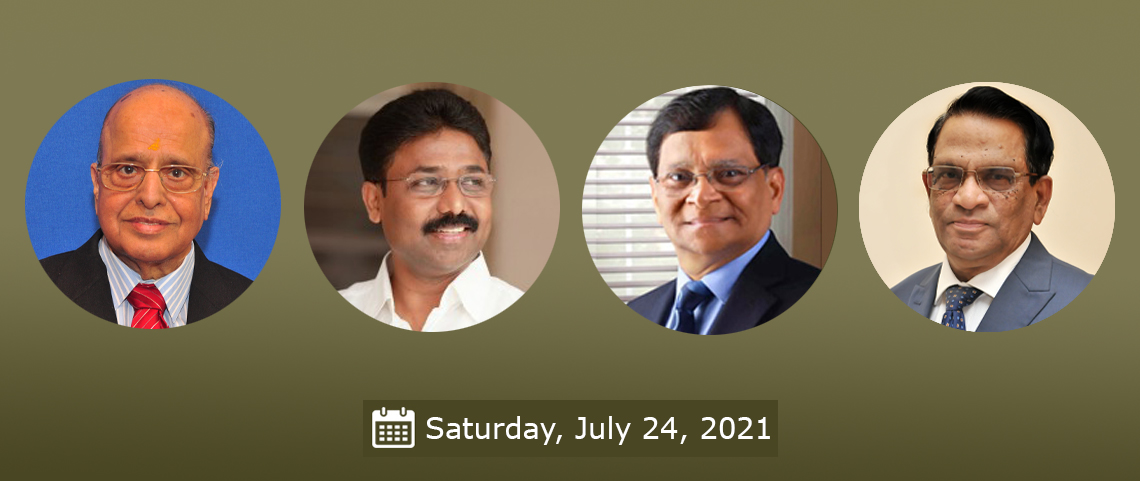 On July 29, 2020, the National Education Policy 2020 (NEP 2020), came into force by the Government of India. SRM University-AP organised a sought after webinar titled “Creating a Vibrant Knowledge Society – An Indian Strategy for 21st Century” on July 24, 2021, as a part of its University Distinguished Lecture Series. Padma Vibhushan Dr K Kasturirangan, Chairman, National Education Policy-2020 (NEP), expounded the salient features and importance of the National Educational Policy. Dr Audimulapu Suresh, Hon’ble Minister for Education, Andhra Pradesh, and Prof Vijayalakshmi Saxena, General President, ISCA, delivered special addresses.
On July 29, 2020, the National Education Policy 2020 (NEP 2020), came into force by the Government of India. SRM University-AP organised a sought after webinar titled “Creating a Vibrant Knowledge Society – An Indian Strategy for 21st Century” on July 24, 2021, as a part of its University Distinguished Lecture Series. Padma Vibhushan Dr K Kasturirangan, Chairman, National Education Policy-2020 (NEP), expounded the salient features and importance of the National Educational Policy. Dr Audimulapu Suresh, Hon’ble Minister for Education, Andhra Pradesh, and Prof Vijayalakshmi Saxena, General President, ISCA, delivered special addresses.Prof. D. Narayana Rao, Pro-Vice-Chancellor, SRM University – AP in his welcome address said that the NEP – 2020 laid the foundation for a new India of the 21st Century. He said that NEP is poised to yield outstanding results in the fields of Higher Education, Research, Innovation and Science & Technology Development in the country. Prof. Narayana Rao said that NEP 2020 is a game-changer for education in the country. He also opined that no country has achieved self-reliance without education of high quality.
In his Distinguished Lecture, Dr Kasturirangan asserted that over the next decade, India would have the highest population of young people in the world, more than 50% below the age of 35 years aspiring for high-quality education.
“How to learn? Moreover, how to become lifelong learners?-This is a critical question that needs to be addressed appropriately. Furthermore, the education of the future generations needs to be reconfigured to meet the targets of the sustainable development goals set for the year 2030. Especially goals for quality education seek higher inclusion, equitable quality education and promotion of lifelong learning opportunities for sustainable economic growth, full and productive employment and decent work for all,” explained Dr Kasturirangan.
Dr Kasturirangan further delineated, “India now needs an education system aligned with the aspirational goals of the 21st century while remaining rooted to India’s values, systems and ethos. NEP-2020 is crafted to provide an integrative yet flexible approach to education, keeping the interconnections of various phases of education. NEP-2020 is an end-to-end educational roadmap for the country with a broad view of encompassing holistic development, kindling the true potentials of the individuals. The policy is designed in accordance with developmental, cognitive and educational psychology, indicating that 5+3+3+4 design is better suited to a child’s learning trajectory.”
Dr Kasturirangan further explained the role of universities, degree colleges, the importance of open and distance education and the role of teachers. Teachers are the pillars of the successful implementation of NEP-2020. The new policy has facilitated the teachers and revised their roles to achieve the goal.
The major emphasis given in the policy is to the aspect of holistic and multidisciplinary education as the fundamental component of every level of education. Universities are perennial sources to generate and disseminate new ideas and knowledge. These are the effective eco-systems for interactions among diverse disciplines. He further requested SRM University-AP to consider setting up a Centre of Excellence in Education to offer B.Ed and M.Ed courses to prepare teachers.
Dr Kasturirangan said that the teachers trained in universities amongst the passionate and high profile Professors, will be excellent teachers and excel in teaching. Thus, the Universities need to take the initiative of setting up Centres of Excellence in education. At the Post-graduation level, one of the key recommendations of the policy is the strengthening of the research at the university system. The policy recommends the creation of a National Research Foundations for the purpose. National Research Foundation came into being with the vision of increasing the quantum and scope of quality research across all disciplines, creating a much larger workforce in the country. It also aims to promote Indian Art, Culture and Languages.
The policy also highlights the critical need to manage research at all levels- pure, applied, transactional, and research addressed to specific needs of the industry and social objectives. The primary role of the National Research Foundation will be to nurture a vibrant research eco-system through adequate funding, mentoring and support of multidisciplinary research in Arts and Humanities, Social and Natural Sciences, Engineering and Technology, including educational technology. Dr K. Kasturirangan emphatically mentioned that India will be the skill capital of the world. He also mentioned that India must lead in emerging technologies: Artificial Intelligence, Additive Manufacturing, Neurosciences, e-mobility etc.
In his Presidential Address, Dr Adimulapu Suresh expressed his happiness to share the various initiatives that Government of Andhra Pradesh is taking towards implementing National Education Policy-2020. Dr Suresh said that the Government of Andhra Pradesh, under the leadership of Hon’ble Chief Minister Y S Jagan Mohan Reddy, has accepted the concept and recommendations of National Education Policy-2020 that it has envisaged.
Dr Suresh agreed that education should have equality, accessibility, affordability, accountability and reachability among all. In the 21st century, poverty can no longer be a barrier to education. Hence, the Government of Andhra Pradesh has introduced several novel programmes and schemes to bring education to everyone, and NEP-2020’s recommendations have aided to take their schemes forward.
The Government of Andhra Pradesh believes that mothers are the key to an educated family. Therefore, the Government has introduced an incentive programme for mothers. Every mother who sends her child to a school will get 15000 rupees from the Government of Andhra Pradesh. The Government has further introduced Full Fee Reimbursement for the students below poverty level.
Dr Suresh proclaimed, “People who were denied education for centuries now can find their voices. Not a single child will be denied education. Hence, the Government of Andhra Pradesh has allocated 17% of its budget, i.e. nearly thirty thousand crores, for education. We are currently spending 2-3% of GSDP for education which is very close to what has been prescribed in the NEP-2020. Following the recommendation of NEP-2020, The Government of Andhra Pradesh is also introducing Academic Banks of Credits (ABC) and Choice based credit system (CBCS) to provide students with freedom and flexibility in education.”
Dr Suresh further mentioned that NEP-2020 emphasises Higher Education but does not enlighten much on Primary Education. CM Y S Jagan Mohan Reddy has taken revolutionary steps to reconstruct Primary Education, developing the common curriculum and language training. Along with that, The Government is also putting an emphasis on Communicative and Soft Skill Training. Therefore, the Government of Andhra Pradesh can proudly say that that they have been the first state in the nation to imbibe the recommendations of National Education Policy-2020.
Dr Vijayalakshmi Saxena, in the Special Address, further elaborated that the previous policy on education was decades old. With the changing time, the policy also needs to be improvised. NEP-2020 has filled the void and came up with suggestions for the making of the 21st century. She said, “As educators, it is our duty to bring youngsters to take up new challenges. The vision of Indian Education, as mentioned in the policy, is to touch everyone’s life, consistent with their needs and necessities. she concluded.
Prof D Narayana Rao, Pro-Vice-Chancellor presented the book – Space and Beyond: Professional Voyage of K. Kasturirangan, to the Hon’ble Minister, and mementoes to all the speakers.
In his concluding remarks, Prof VS Rao, Vice-Chancellor of SRM University-AP, congratulated Dr Kasturirangan for the brilliantly conceptualized new education policy. He agreed with Dr Kasturirangan to the need of having a dedicated centre for the advancement of education. Prof Rao announced the inception of the Centre of Educational Innovation and Excellence that SRM University-AP has envisaged in the near future.
Continue reading → - CSE students complete Semester Abroad Programme at UC Davis July 26, 2021
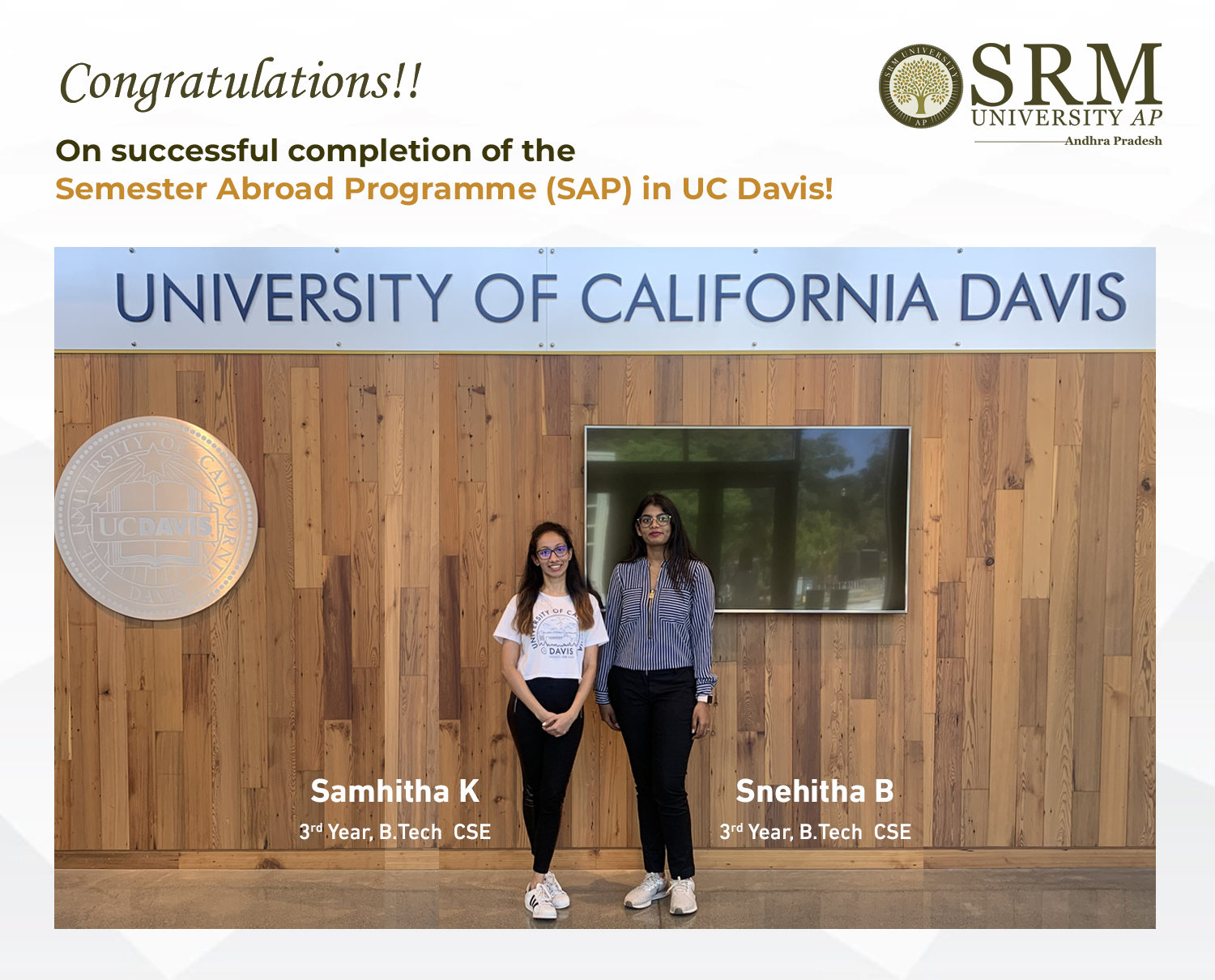 Barukula Snehitha Naga Sai and Kamma Samhitha are two brilliant third-year Computer Science Engineering students selected for the enviable Semester Abroad Programme (SAP) at the University of California, Davis. The students received a partial scholarship from SRM University-AP to complete their final semester abroad with the global study programme at UC Davis. The selection process for the semester abroad programme generally starts at the end of the 3rd and 5th semesters when our university carries out student interviews. A minimum of 8.7 CGPA is required to be eligible for the SAP scholarship and the programme focuses on building engineering design processes along with developing behavioural and communication skills of meritorious students.
Barukula Snehitha Naga Sai and Kamma Samhitha are two brilliant third-year Computer Science Engineering students selected for the enviable Semester Abroad Programme (SAP) at the University of California, Davis. The students received a partial scholarship from SRM University-AP to complete their final semester abroad with the global study programme at UC Davis. The selection process for the semester abroad programme generally starts at the end of the 3rd and 5th semesters when our university carries out student interviews. A minimum of 8.7 CGPA is required to be eligible for the SAP scholarship and the programme focuses on building engineering design processes along with developing behavioural and communication skills of meritorious students.The Study Abroad Programme provided Snehitha and Samhitha with the opportunity to cooperate with industrial designers. For practical hands-on experiences, Snehitha worked for the UC Davis school of nursing. Besides that, UC Davis promotes a variety of student clubs and technical programmes that bring students from all over the world together. This opportunity also helped students to live in a new culture and travel through different cities abroad. Prof Ragunathan and Dr Priyanka from the Department of Computer Science and Engineering constantly supported the students throughout their semester abroad journey at UC Davis.
For engineering graduates, technical skills and hands-on experience with industry is inevitable. SRM University-AP ensures that every student grabs opportunities to excel in their respective disciplines.
Snehitha extended her gratitude to all her professors at SRM University-AP who guided her to this achievement. “I really appreciate the curriculum structure at SRM AP that offers us practical knowledge rather than forcing us to memorise theories. The concrete understanding of the subject aided me greatly in learning about real-world problems, and accomplish this dream of studying a semester abroad”, she said.
This programme has taught me how to be adaptable, resilient and above all, how to make the best use of resources available. I have been and am fortunate to study from the best professors, both at SRM AP and UC Davis”, said Samhitha.
Continue reading → - Assessing the benefits of irrigation against heat stress in agriculture July 24, 2021
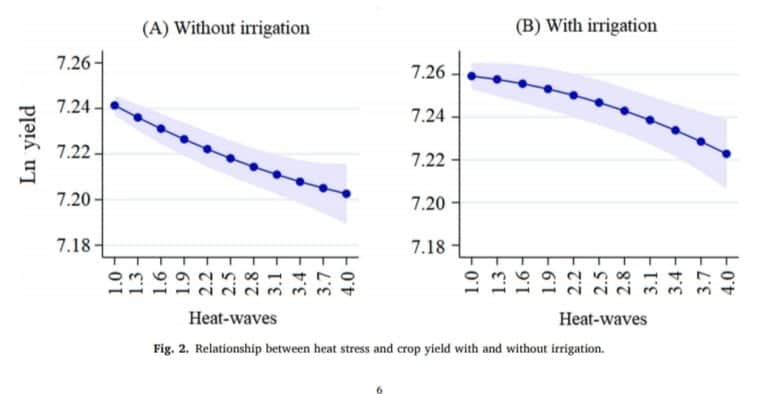 Heat stress negatively affects crop yield and its impact has increased over time. Researchers in India study this situation with utmost priority. Consequently, Dr Ghanshyam Kumar Pandey, Assistant Professor in the Department of Economics at SRM University-AP has co-authored a paper with Pratap S Birthal and et. al titled “Benefits of irrigation against heat stress in agriculture: Evidence from wheat crop in India” in the journal Agricultural Water Management, Vol 255, having an Impact factor 4.02.
Heat stress negatively affects crop yield and its impact has increased over time. Researchers in India study this situation with utmost priority. Consequently, Dr Ghanshyam Kumar Pandey, Assistant Professor in the Department of Economics at SRM University-AP has co-authored a paper with Pratap S Birthal and et. al titled “Benefits of irrigation against heat stress in agriculture: Evidence from wheat crop in India” in the journal Agricultural Water Management, Vol 255, having an Impact factor 4.02.Applying the fixed effects regression technique to the highly spatially disaggregated district-level data from 1966–67 to 2011–12. This paper has assessed the impact of heat stress on wheat production in India and concurrently evaluated the role of irrigation in offsetting its harmful impact. The study has brought out three key highlights:
(i) Heat stress negatively impacts crop yield, and the impact has increased over time.
(ii) Irrigation, besides its contribution towards improving crop yield, also moderates the harmful impact of heat stress, but over time its effectiveness has declined.
(iii) The measure of heat stress built on multiple aspects of excess temperature (i.e., intensity, persistence, and frequency) explains variation in crop yield better than working on a single aspect of it.Given the increasing scarcity of irrigation water and rising temperature, these findings suggest the need for exploring technological and policy options for improving irrigation water use, efficiency, and breeding of crops for heat tolerance and low water footprints.
This research paper is written in collaboration with ICAR-National Institute of Agricultural Economics and Policy Research, PUSA, New Delhi. Dr Ghanshyam’s future projects are focused on climate change and agriculture, and the effect of climate change on the livestock sector in India.
Read the full paper here: https://doi.org/10.1016/j.agwat.2021.106950
Continue reading → - ECE students accomplish international internship in Canada July 22, 2021
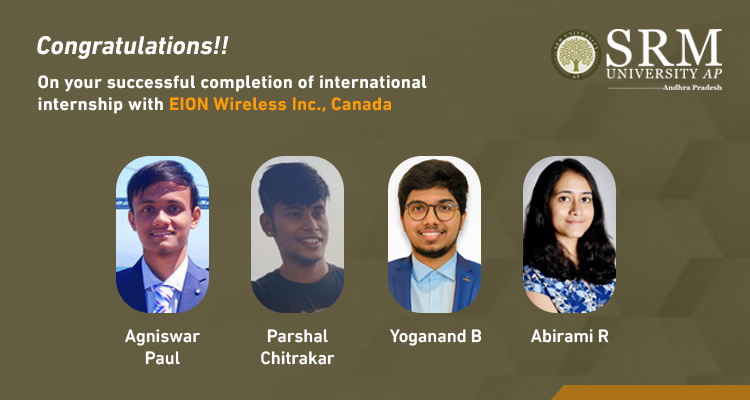 Yoganand B, Parshal Chitrakar, Agniswar Paul, Abirami Ravishankar are four brilliant students from the Department of Electronics and Communication Engineering at SRM University-AP who have successfully completed an international internship with EION Wireless Inc, Canada. The students worked as engineering interns with this reputed wireless solutions firm in Canada for five and a half months (Jan 15- June 30) obtaining an internship salary of 500 CAD per student every month. Through this opportunity, the students could build a system that is able to send data to long distances.
Yoganand B, Parshal Chitrakar, Agniswar Paul, Abirami Ravishankar are four brilliant students from the Department of Electronics and Communication Engineering at SRM University-AP who have successfully completed an international internship with EION Wireless Inc, Canada. The students worked as engineering interns with this reputed wireless solutions firm in Canada for five and a half months (Jan 15- June 30) obtaining an internship salary of 500 CAD per student every month. Through this opportunity, the students could build a system that is able to send data to long distances.Selection Process:
a. Internal selection: Based on the CV and projects undertaken, the ECE Faculty conducted interviews and shortlisted the students.
b. Personal Interview: The shortlisted students attended the interview with the company in which, the company scrutinised their project, skills, and whether they were relevant to the company’s requirements.
c. Techincal Interview: This round focused on analysing technical skills. A technical problem statement was given to members and was asked to come up with a solution in 10 minutes.
d. Coding test: In this round, coding questions were distributed and students had to submit documents of output and on how the code was processed.For engineering graduates, technical skills and hands-on experience with industry is inevitable. SRM University-AP ensures that every student grabs opportunities to excel in their respective disciplines.
Student Testimonial- Parshal Chitrakar:
I would like to thank the faculty of the ECE Department at SRM AP for this great opportunity. Being a part of this internship programme by EION wireless has been one of my first and best experiences in the industry. Being a fresher, this opportunity gave me a chance to apply my knowledge and skills in developing real-time applications. This five and a half months internship taught me different ways to look at things, work with people from diverse backgrounds, and helped me develop my technical as well as soft skills. Before this, I was focused only on personal achievements, but when we work for a company it has to be focused on the public demand and common good. I think this is the main difference between academia and industry. There is no such difference between academic-based projects and industry-based projects; it is just how we think, showcase our abilities and how our work reaches the target stakeholders.
Continue reading → - Ajay Sugandh secures admission to IIM Ranchi July 20, 2021
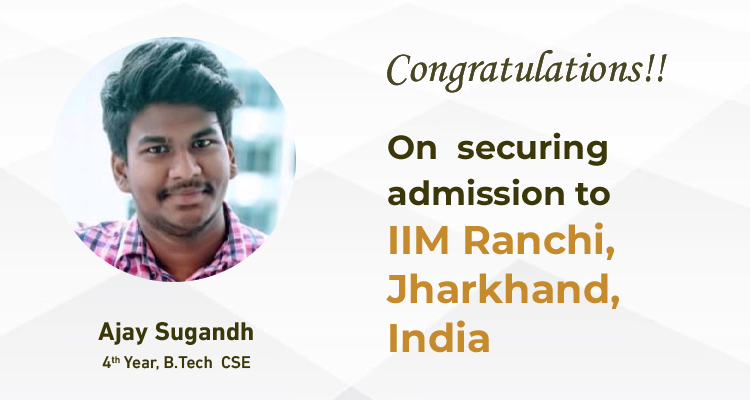 For Ajay Sugandh, securing admission to one of the prestigious Indian Institutes of Management (IIM) is a dream come true. Clearing the Common Admission Test (CAT) with a percentile of 90, he has bagged an admission offer at IIM, Ranchi. CAT is a national-level computer-based management entrance examination to reputed IIMs. More than 2 lakh candidates appear for the test and a few with a percentile of 90-99 secure a position on one of the IIM campuses.
For Ajay Sugandh, securing admission to one of the prestigious Indian Institutes of Management (IIM) is a dream come true. Clearing the Common Admission Test (CAT) with a percentile of 90, he has bagged an admission offer at IIM, Ranchi. CAT is a national-level computer-based management entrance examination to reputed IIMs. More than 2 lakh candidates appear for the test and a few with a percentile of 90-99 secure a position on one of the IIM campuses.IIM Ranchi is a reputed business school established in the year 2009 and is the ninth IIM in the country. It holds the 10th rank in the NIRF ranking. The eligibility of the candidates is evaluated through CAT, followed by the written eligibility test (WAT) and Personal Interview (PI).
Ajay Sugandh is a CSE graduate hailing from Guntur, Andhra Pradesh. After completing an MBA from IIM, Ranchi, he wishes to pursue a career in Marketing. Ajay is trained by the TIME coaching institute that helped him crack the difficult test. He had prepared for a year and worked on soft skills, aptitude etc. His hobbies include watching movies and reading books.
Speaking of the support received from SRM University-AP, Ajay acknowledged, “Firstly, I am grateful to the faculty members of the Department of CSE who have been a constant support in reaching my goals. Secondly, the tremendous support from all my peers and family has encouraged me to manage my course CAT preparation together”.
Continue reading → - Controlled loading of MoS2 on hierarchical porous TiO2 for enhanced photocatalytic hydrogen evolution July 19, 2021
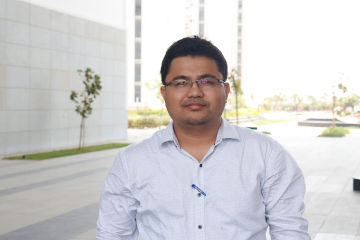 Ever since the breakthrough research on H2 photogeneration from water using TiO2 under UV-light irradiation, an enormous amount of research has been conducted on photochemical H2 evolution using different semiconductor-based photocatalysts. Consequently, a research paper titled “Controlled Loading of MoS2 on Hierarchical Porous TiO2 for Enhanced Photocatalytic Hydrogen Evolution” has been published by Prof Ranjit Thapa, Professor of Physics, SRM University – AP, as a co-author, in The Journal of Physical Chemistry C, having an Impact Factor of 4.189.
Ever since the breakthrough research on H2 photogeneration from water using TiO2 under UV-light irradiation, an enormous amount of research has been conducted on photochemical H2 evolution using different semiconductor-based photocatalysts. Consequently, a research paper titled “Controlled Loading of MoS2 on Hierarchical Porous TiO2 for Enhanced Photocatalytic Hydrogen Evolution” has been published by Prof Ranjit Thapa, Professor of Physics, SRM University – AP, as a co-author, in The Journal of Physical Chemistry C, having an Impact Factor of 4.189.In this work, Prof Thapa describes three important factors for helping in the generation of hydrogen using proposed MoS2/TiO2 catalyst, (i) TiO2 for effective charge transfer, (ii) MoS2 for plasmon induction (iii) large surface area and active sites. It was shown that hierarchical porous TiO2 can be interfaced successfully with marigold-flower-like MoS2 flakes with intriguing photophysical properties, viz., visible-light response, controlled electron−hole recombination, and sustainable H2 production over prolonged light irradiation due to the synergic effect of flowerlike MoS2 and the fibrous wormhole mesoporous channel of TiO2. Further, the researchers have used density functional theory (DFT) to identify the active sites and calculated the change in Gibbs free energy (ΔGH). “We have also studied the charge density difference to understand about electron transfer pathway. The change free energy of hydrogen adsorption (ΔGH*) is a good indicator to estimate the hydrogen evolution activity in the acidic medium. From the DFT study, it is clear that O sites of MPT heterostructure are more favourable for HER reactivity”, said Prof Ranjit Thappa.
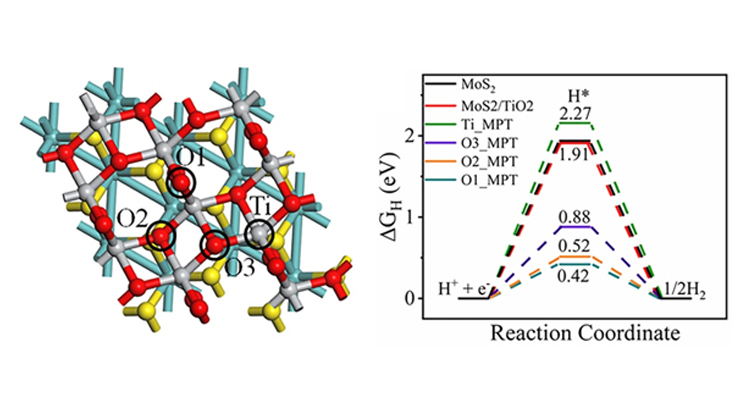
Social implications of the research:
In the last few decades, with the decline in non-renewable resources and increasing environmental pollution, significant attention has been given to renewable and clean energy domains. Hydrogen is considered one of the most suitable energy carriers due to its higher energy density per unit mass in comparison to other chemical fuels. In recent times, photocatalytic fission (Photocatalysis is a process in which light energy is used to drive pairs of chemical reactions. Through the absorption of light, an excited electron/hole pair is produced) of water has been considered an attractive solution for solar to chemical H2 energy conversion. Also, the process of water splitting is highly endothermic. Therefore, the development of an excellent, stable, efficient, and economical photocatalyst for ultrahigh H2 production efficiency is paramount to researchers.This work is done in collaboration with the Department of Energy and Environmental Engineering, CSIR-Indian Institute of Chemical Technology, Hyderabad 500007, India.
Prof Ranjit Thapa is doing an investigation to find the possibility of hydrogen evolution reaction (HER) on multiple borophene analogues (α, β12, χ3) on all unique sites. Understanding the role of the coordination number of the boron atoms in the borophene analogues with the HER efficiency, and studying the pathways Volmer-Tafel (V-T) on each site to understand the completed HER process on borophene analogues are his future research projects. His research group is also interested to identify the role of sigma and pi-electron occupancy on the V-T pathway.
Read the full paper here: https://doi.org/10.1021/acs.jpcc.1c01922
Continue reading → - SRM University AP collaborates with Harvard Business School Online July 17, 2021
SRM University opens the gates to new opportunities for students, alumni & faculty members as it collaborates with the world-renowned educational institution
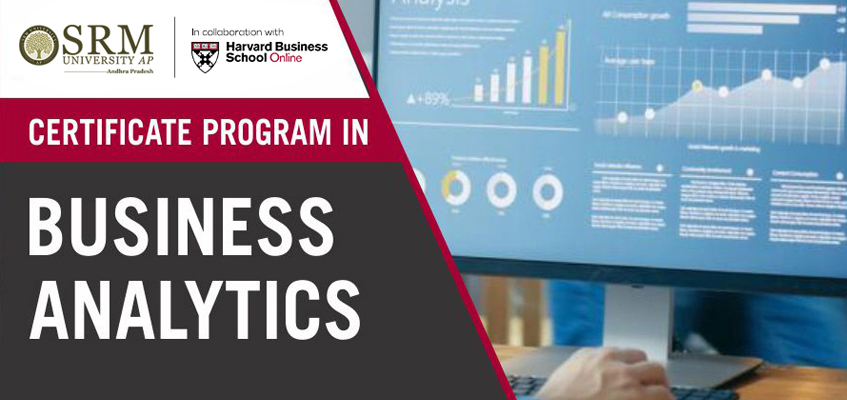 SRM University, AP a top-notch and new age university situated in the heart of Andhra Pradesh, collaborates with Harvard Business School Online to offer high-impact online courses to its students. Eliminating the difference between borders and nations, the university is focused on providing global exposure to the students and opportunities to upskill themselves with a gamut of courses to stay relevant in the ever-changing economy. Students already enrolled in flagship programs and courses of SRM University, AP such as School of Entrepreneurship and Management Studies will now have an added advantage to enhance their calibres with the global association.
SRM University, AP a top-notch and new age university situated in the heart of Andhra Pradesh, collaborates with Harvard Business School Online to offer high-impact online courses to its students. Eliminating the difference between borders and nations, the university is focused on providing global exposure to the students and opportunities to upskill themselves with a gamut of courses to stay relevant in the ever-changing economy. Students already enrolled in flagship programs and courses of SRM University, AP such as School of Entrepreneurship and Management Studies will now have an added advantage to enhance their calibres with the global association.The collaboration with Harvard Business School Online reflects international unison in these unprecedented times and is further offering different programs such as Business Analytics, Economics for Managers, Financial Accounting, CORe(Credentials of Readiness) and others. These programs are integrated with the regular courses of SRM University, AP such as BBA, MBA (General), MBA (Business Analytics) and MBA (Banking and Financial Services).
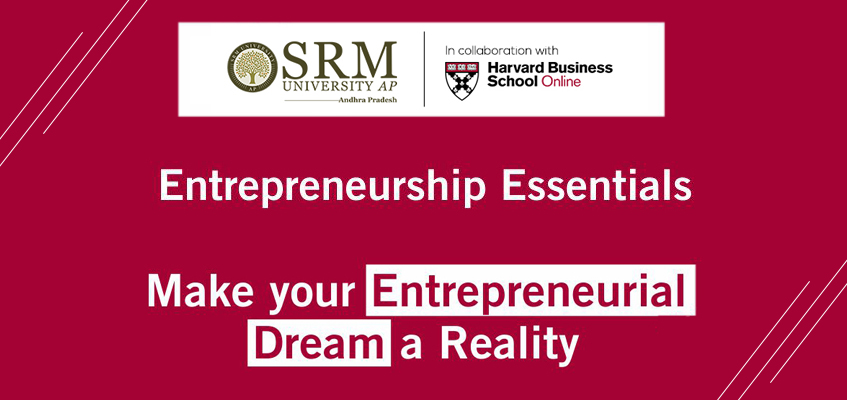 Harvard Business School Online offers a unique and highly engaging way to learn vital business concepts. The online certificate and credential programs are offered via HBS On line’s innovative online platform and are designed to bring the Harvard Business School classroom experience to life. The HBS Online courses put participants at the centre of the learning experience. The learning model is built around three key characteristics: active, case-based, and social learning.
Harvard Business School Online offers a unique and highly engaging way to learn vital business concepts. The online certificate and credential programs are offered via HBS On line’s innovative online platform and are designed to bring the Harvard Business School classroom experience to life. The HBS Online courses put participants at the centre of the learning experience. The learning model is built around three key characteristics: active, case-based, and social learning.Dr Sathyanarayanan, President of SRM Group of Institutions, says that all HBS Online courses are led by industry experts and international faculty and align smoothly with global standards of excellence. Encouraging students to have multi-disciplinary skills and motivating them to upgrade themselves while getting additional support from global peer learning groups, SRM University, AP, is preparing them to become industry-ready professionals.
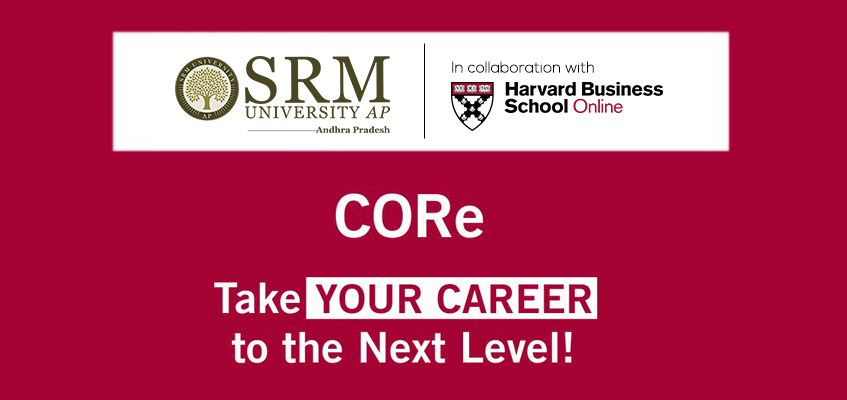 Commenting on the collaboration, Prof V S Rao, Vice-Chancellor, SRM University-AP said, “We are focusing on collective growth and success of our students, alumni and faculty. SRM University, AP has curated a gamut of courses supporting their educational aspirations by providing them with Scholarships and Financial aid programs and this will help the learners to enrol for their desired courses without having to miss out on the opportunities due to monetary constraints.”
Commenting on the collaboration, Prof V S Rao, Vice-Chancellor, SRM University-AP said, “We are focusing on collective growth and success of our students, alumni and faculty. SRM University, AP has curated a gamut of courses supporting their educational aspirations by providing them with Scholarships and Financial aid programs and this will help the learners to enrol for their desired courses without having to miss out on the opportunities due to monetary constraints.”The focus of Harvard Business School Online courses, according to Prof.AVS.Kamesh is to enhance student’s proficiency and skillset in various verticals and this collaboration will help SRM University AP participants to engage in Real-World Learning with a global community of peers.
Continue reading →

